UMHS 2019 graduate Dr. Valeria Fomitcheva grew up in Ottawa, Canada but now works in a primary care private practice in Baltimore, MD. It’s been a challenging but rewarding journey for this bright and upbeat young doctor.
The UMHS Endeavour spoke to Dr. Fomitcheva about her experience as a Canadian studying medicine abroad at UMHS, how she decided on attending UMHS after speaking to a friend attending the school and also the volume of information and inspiration that she received from UMHS Associate Director of Admissions for Canada, Geneviève Gagnè, her favorite professors at the school, her clinical rotations, completing an internal medicine residency at Sinai Hospital in Baltimore, MD, her new private practice in primary care, and more.
From internal medicine residency to private practice
UMHS Endeavour: Dr. Fomitcheva, you completed an internal medicine residency at Sinai Hospital in Baltimore. What was your residency experience there like?
Dr. Valeria Fomitcheva: I have to say that I think anyone who did residency from 2019 to 2022 is going to say that it was a different experience because of COVID-19.
Right. Of course.
But my general overall comment for anyone going into residency and applying and doing their ranking list—by the way, congratulations on everyone that matched this year at our school—the recommendation is going to be the experience, and the residency is what you make of it. I think by the time that I got into residency, I was happy to finally be doing clinical work and getting paid. I enjoyed my residency experience. It was tough. It was hard, just like most of the different stages that you go through in medical school. But overall, it was pretty good.
You are now presently working in private practice as a primary care attending. Can you just explain some of the things that a primary care attending does in private practice, and what are some of the most rewarding things about what you're doing right now?
Generally, the idea is that primary care attending, internal medicine trained, you build a patient base that you regularly follow for preventative medicine. The most rewarding part for me is building long-term relationships, when patients come to me and say, "This is my doctor." They know me by name. You get to have more of a personal relationship with patients. Sometimes you're treating several generations. It can be grandparents, patients, and their children, once they get to the age of 18.
And then the most rewarding thing I think that I hear on a regular basis is when people say, "Wow, thank you for explaining that." The primary care setting actually allows you a little bit more time to delve into, why do we need to take statins? Why do we need to take blood pressure medication? Why is it important? I like to provide education for my patients, and my patients really appreciate that.
It sounds like you do a really good job explaining things. That's so important in primary care. Finally, can you tell me one or two things that you like the most about being a Canadian studying medicine abroad at UMHS, and also one way that UMHS helped you become the doctor that you are today?
Specifically, for UMHS, the reason why I chose that school was the small classroom size. I don't know if you know many other Caribbean medical schools. Their Bio 101 class, there's like 700 students in certain universities. I didn't want that. I've been in classrooms that are large and you're just a number, and I felt like my medical experience needed to be different than my undergraduate experience.
Being a Canadian studying medicine abroad or going to medical school, I feel like I actually was well-prepared because of my undergraduate background. I think we have very strong schools and universities in Canada, so I think that a lot of the times, I found that I had an upper hand because university is tough in Canada. At least personally, that's what I found.
Yeah. I think mostly, it was the fact that I got a very solid foundation in basic sciences on the island before I started doing clinical rotations, which are still carrying me through to this day in my practice.
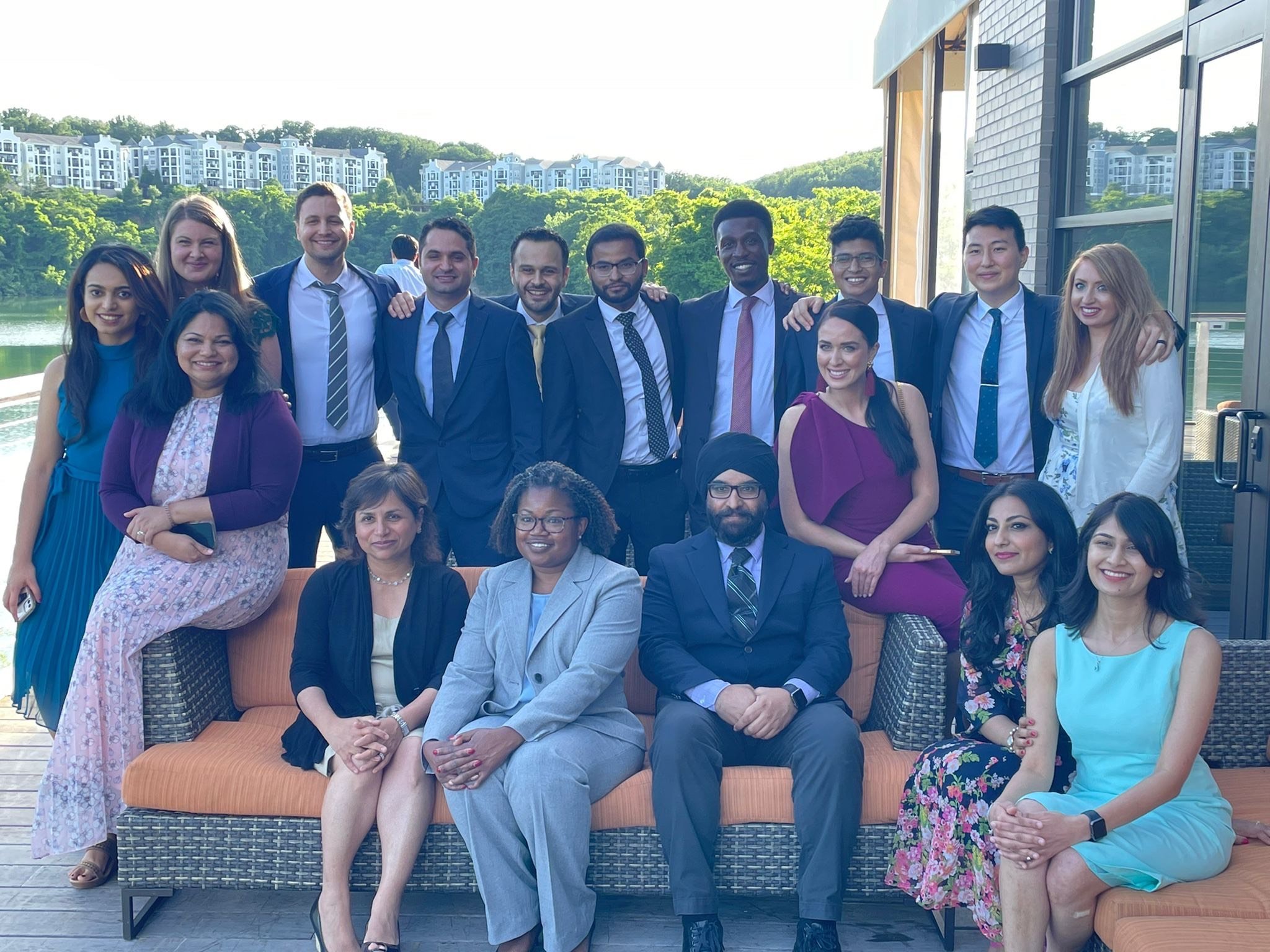 Dr. Valeria Fomitcheva (center right, in purple dress) at Sinai Hospital of Baltimore residency graduation. Photo courtesy of Dr. Fomitcheva.
Dr. Valeria Fomitcheva (center right, in purple dress) at Sinai Hospital of Baltimore residency graduation. Photo courtesy of Dr. Fomitcheva.
That’s amazing. Do you have any general advice for Canadians that are considering attending UMHS? Maybe they saw something about an upcoming information seminar or something and they're a little hesitant.
I think I have probably three things I would say. Be prepared to move a lot. The first four or five semesters, depending on how long your basic sciences are, you'll be in one place, which is great. It's great to have a very stable weather that you can study in all the time. And then, as a Canadian, I think it's important to make sure that you can secure finances. I know that loans and things like that can be difficult for Canadians, and so it's important to make sure that you plan ahead financially. And then, the last thing is don't give up. Hard work always pays off, so just keep going.
You worked with Geneviève Gagnè as your admissions counselor when you applied to UMHS. What was it like having Geneviève as your rep?
Geneviève is amazing. We're from the same city and I had a lot of hesitancy about moving to the Caribbean, starting in a Caribbean school. When I met her, she met me in person. She lives in Gatineau, on the Quebec side. I lived in Ottawa at the time. We met in person for coffee. She's very approachable. She's very, very knowledgeable. She used to work for the admissions office in one of the medical schools in Canada.
She's very knowledgeable of the process of applying to medical schools and how difficult it can be, and some of the barriers that we experience. Having a contact who is from Canada and answered all of my questions was probably also the reason why I chose UMHS over other schools that didn't have a Canadian representative.
You had some really good guidance. I know Gen's a top-notch counselor. Anything else that you'd like to say about Canadians considering med school in the Caribbean, specifically UMHS?
I think if you feel like you're ready, just go for it. It doesn't matter if you do medical school in Canada or the US, it's going to be hard regardless. But if you keep working, you'll get through it. You just got to keep doing it, keep trying, and hard work always pays off.
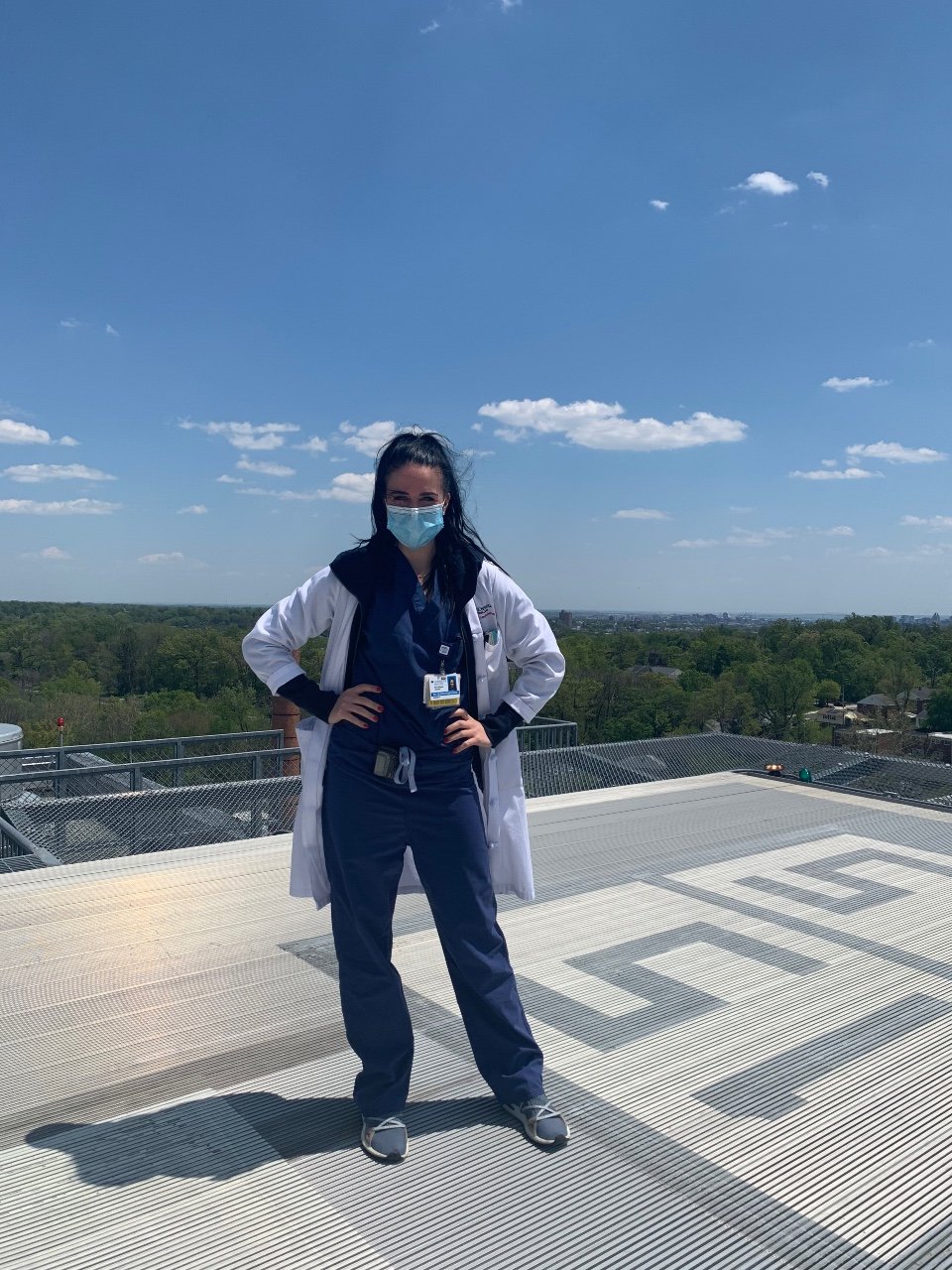 Dr. Valeria Fomitcheva in her last month of intern year 'when we started wearing masks everywhere.' Photo courtesy of Dr. Fomitcheva.
Dr. Valeria Fomitcheva in her last month of intern year 'when we started wearing masks everywhere.' Photo courtesy of Dr. Fomitcheva.
Growing up in Canada
Dr. Fomitcheva, tell us where you grew up in Canada, and did you always want to be a doctor?
I am a first-generation immigrant, grew up in Ottawa, moved there when I was eight. I decided that I wanted to go into medical school after my, I think it was grade 11 or grade 12, biology class, when we did dissection of the pig. I really enjoyed learning the sciences, and I think I understood that I couldn't be sitting at a computer, behind a desk. I love talking to people. I love interacting with people, so it just naturally formed that way at the end of my high school years.
You did your undergraduate studies at the University of Ottawa. What was your major?
I actually got two undergrad degrees. I received a Bachelor of Science in psychology and a Bachelor of Science in health sciences.
What made you choose UMHS over other medical schools when you were thinking about applying to med school?
Originally, I did a pretty rough search. I did have a friend who was currently attending UMHS at the time.
That must have helped you make your decision, right?
It was a recommendation that had initially steered me in the direction of UMHS. I think the small classroom size and having Geneviève on board at the time is probably what sold me on the school specifically versus any other Caribbean school.
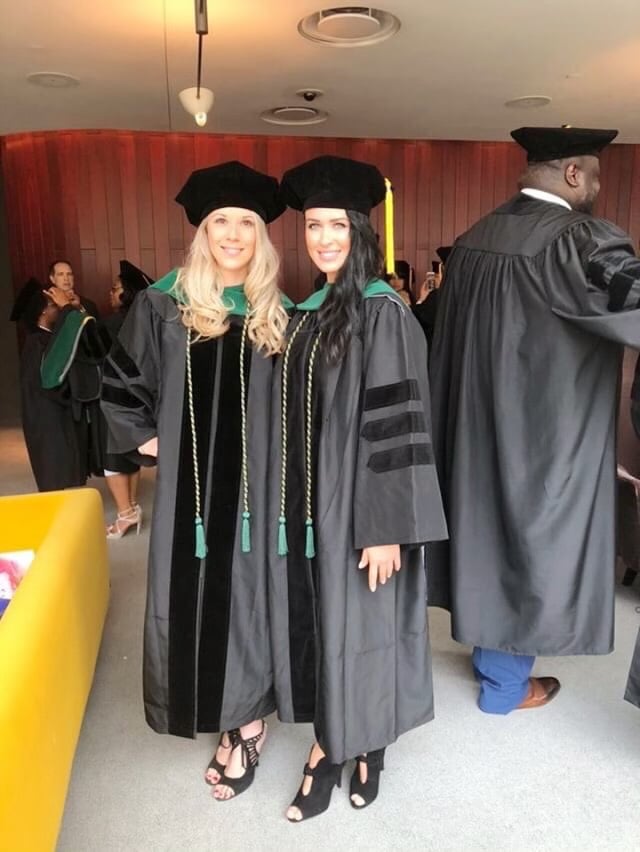 Dr. Valeria Fomitcheva (right) with a fellow UMHS graduate & friend at the 2019 UMHS Commencement Ceremony at Lincoln Center in NY in 2019. Photo courtesy of Dr. Fomitcheva.
Dr. Valeria Fomitcheva (right) with a fellow UMHS graduate & friend at the 2019 UMHS Commencement Ceremony at Lincoln Center in NY in 2019. Photo courtesy of Dr. Fomitcheva.
Primary care practice & her residency
Let's talk a little bit about what interests you the most about primary care and being an attending. Does working as an attending physician offer you a good work-life balance?
I just graduated [from residency] in 2022. I am a pretty new attending, I would say. Probably not at my ideal work-life balance at this point, but that is the hope. I think this is something that we all strive towards. But what I do enjoy as an attending is probably at this point in my training, I'm ready to have autonomy over how I practice medicine.
What’s a typical day like for you, Dr. Fomitcheva?
My official office hours are nine to four. I usually come in anywhere between 8:00 to 8:30am, so I can pre-review my charts, answer any kind of electronic messages or fill out faxes. I will see patients pretty much throughout most of the day. I don't really take a lunch. If there is a little break, I'll be working on notes and things like that. And then my last appointment is technically quarter to three or 4:00pm, but sometimes patients run a little late, so I'll be seeing them till 4:30 or 5:00pm. And then I'll work on some notes that same evening. And then that's on a Monday-to-Friday schedule. Because I'm building a patient panel right now, I do have notes and things like that that I also work on over the weekend while I am still in the process of acquiring patients.
Great. For the most part, you have a regular Monday through Friday schedule, but you may do a little work on the weekends?
Yes, correct. I think at this point, I'm actually pretty happy to have a very regular schedule, actually. Yeah.
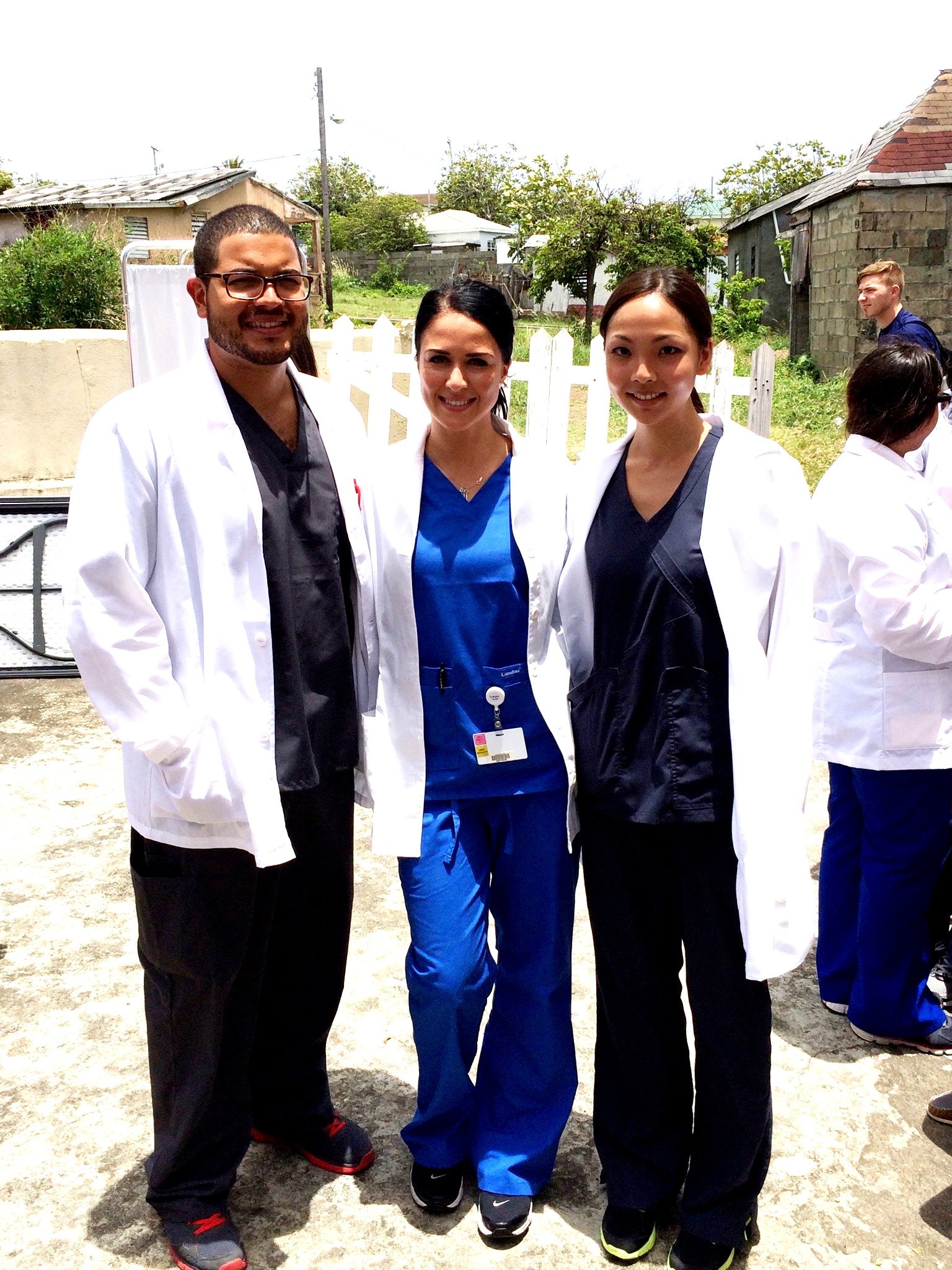 Dr. Valeria Fomitcheva (center) at a UMHS Quarterly Health Fair in St. Kitts. Photo courtesy of Dr. Fomitcheva.
Dr. Valeria Fomitcheva (center) at a UMHS Quarterly Health Fair in St. Kitts. Photo courtesy of Dr. Fomitcheva.
You mentioned earlier that anyone who graduated around 2019 or 2020 had to cope with COVID-19. I know there's been so much information about it, but what's one thing about the whole COVID-19 pandemic that you think helped you become a better doctor?
Probably just resilience. We have faced a lot of negativity in medicine, unfortunately, during this time, because we practiced during a time when a lot of patients were very, very sick, but we didn't have much to offer them in terms of medications or treatments. As residents, we had to experience a lot of death and dying of our patients, which was difficult. But it made me appreciate the importance of—as a primary care physician—why I should be talking about things like goals of care and end-of-life care with patients in the primary care setting.
I think it definitely made me more attuned to the fact that these are conversations that I should be having with my patients as a primary care physician, and I should be leading them through understanding what kind of life-supporting procedures we offer, and whether or not this is something that the patient would like to have for themselves or not.
Right. You were talking earlier about being in primary care, talking to people about things like the importance of statins. Do you find that you like teaching people how to be healthier, how to have a better immune system so when one of these diseases gets out there, their immune system is better able to handle it?
Yes, so health maintenance is my main focus in the primary care setting. We look at preventing cardiovascular disease, decreasing cardiovascular risk factors, which is usually blood pressure, elevated cholesterol, diabetes, and weight management. I've noticed that since putting more focus on outpatient medicine, I actually do a lot of weight management counseling. And that comes in different forms, whether it's lifestyle modifications or medical management with actual prescribed medications. Yes, health maintenance, health education, healthy lifestyles, I do a lot of education with my patients on that, definitely.
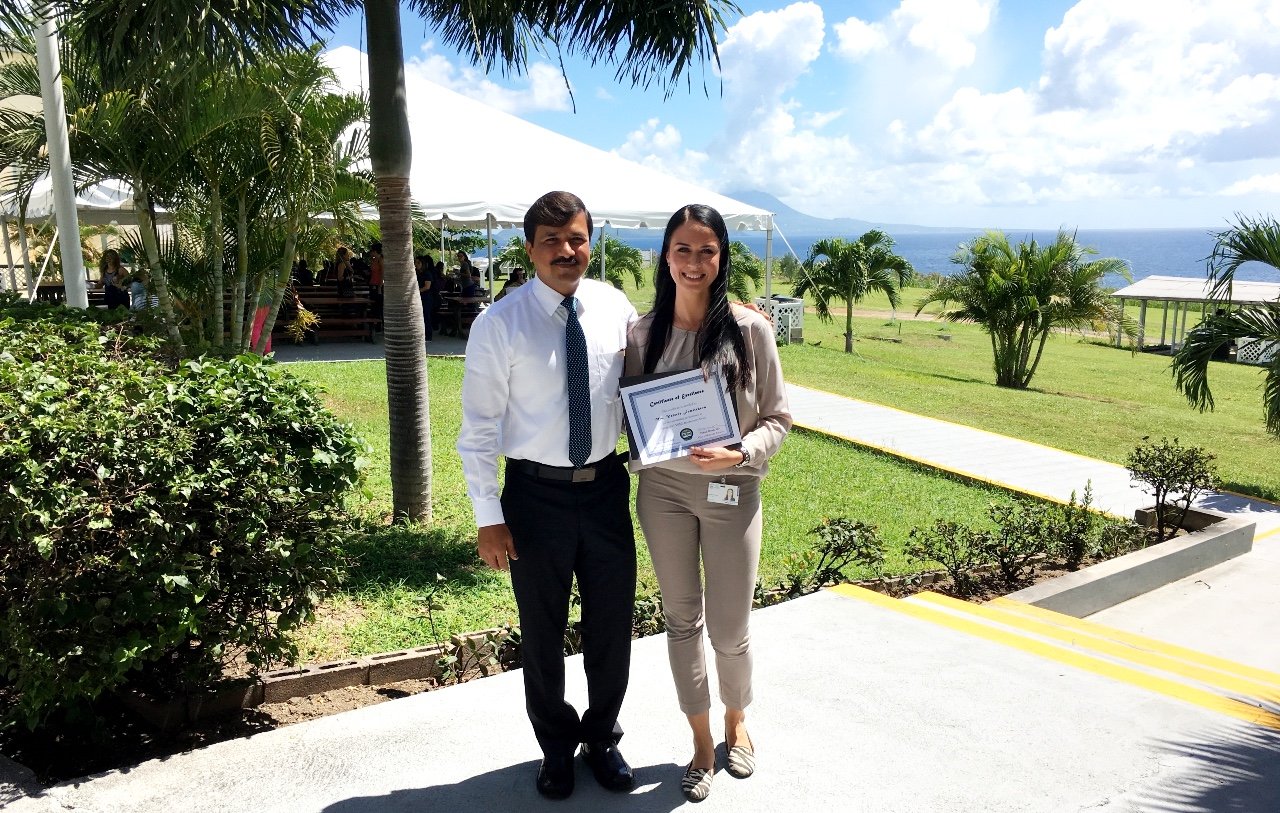 Dr. Valeria Fomitcheva in St. Kitts after she received an award presented by UMHS professor Dr. Prakash Mungli (left). Photo courtesy of Dr. Fomitcheva.
Dr. Valeria Fomitcheva in St. Kitts after she received an award presented by UMHS professor Dr. Prakash Mungli (left). Photo courtesy of Dr. Fomitcheva.
UMHS professors who made a difference
We already talked about how wonderful Gen is, as far as staff members, but can you think of any professors or even people that you worked with in residency that really made a difference for you at UMHS?
In terms of professors, absolutely. Dr. Jagadeesh Nagappa, who is a very strong professor of physiology and Dr. Alfred Roy was our pathology professor during the time that our class was on the island. We actually nominated him for a Figure 1 award, which is an app that does clinical vignettes and you answer the questions. And Dr. Prakash Mungli [Interim Dean of Basic Sciences, Chairman of Molecular Sciences, Course Director and Professor of Biochemistry], of course.
Yes. All three of those professors are amazing, right?
I loved my basic sciences professors because they made a very solid foundation of medicine for me that I've been able to build on in the upcoming years. I still continue to practice some of the principles that were taught to me. Even today in medicine, sometimes when I look at blood work or when I think about blood gases and things like that, I do have to go back to basic sciences sometimes.
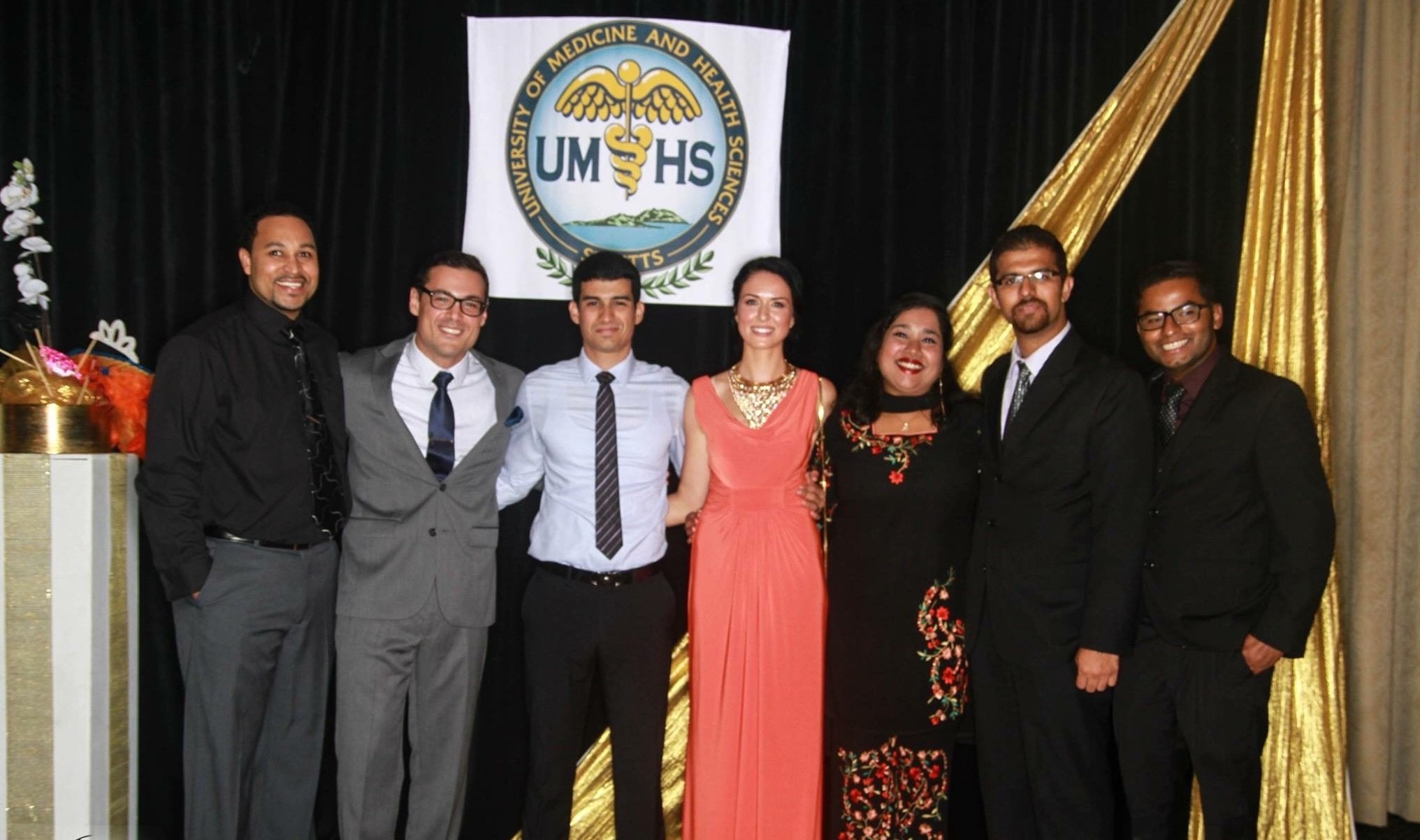 Dr. Valeria Fomitcheva at the St. Kitts Island Graduation. Photo courtesy of G Vision Photography.
Dr. Valeria Fomitcheva at the St. Kitts Island Graduation. Photo courtesy of G Vision Photography.
Why she’s proud to be a UMHS grad
Is there anything else that you would like to add about UMHS or being a Canadian studying medicine abroad or practicing that we haven't covered?
I think every stage of medicine and medical school will be difficult, but you have to continue. You have to keep going. You work through the difficult parts and it pays off. You have to find joy in what you do, because whether it's the specialty that you choose or the type of medicine you choose to practice, because these hard days will be much, much easier when you get to see. Do the work that you like, but then see the patients, and they're happy and they thank you. It's a very humbling and a rewarding career. I think that there's definitely lots of hurdles, but it's all worth it. You’ve just got to keep going.
During my residency years, in my class of residents in 2019, we had four other UMHS students that had matched within the same program with me. There were two UMHS students a year ahead of me who were great mentors for me, the people that were ahead. And then my same colleagues in my same year, everyone got a job or matched to fellowships of their choice once they graduated. I think UMHS provides a good foundation. We have a good reputation in the medical community because all the attendings were very happy with our residents. I have to personally say I'm proud to be from UMHS.
UMHS YouTube interview with Dr. Valeria Fomitcheva
Contact Dr. Valeria Fomitcheva via email at vfomitcheva@gmail.com
(Top photo) Dr. Valeria Fomitcheva. Photo: Courtesy of Dr. Fomitcheva.

Scott is Director of Digital Content & Alumni Communications Liaison at UMHS and editor of the UMHS Endeavour blog. When he's not writing about UMHS students, faculty, events, public health, alumni and UMHS research, he writes and edits Broadway theater reviews for a website he publishes in New York City, StageZine.com.
















